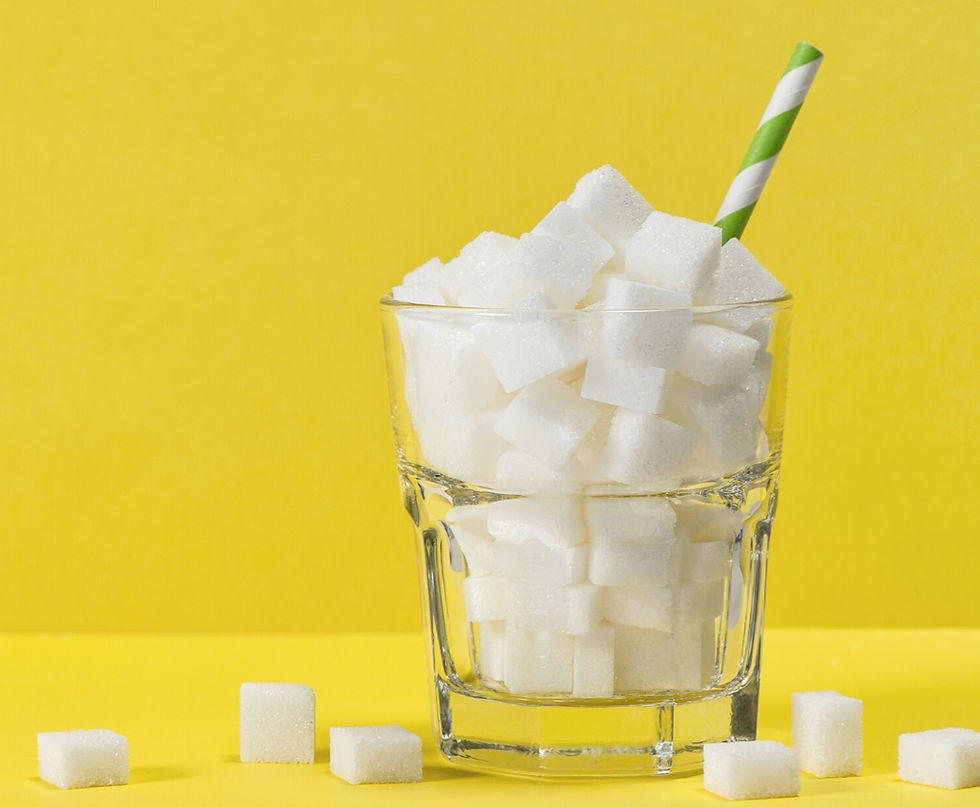We all love the sweet stuff....
- Sally
- Apr 12, 2020
- 4 min read

Now I have a sweet tooth, I love chocolate and foods with a sweet taste, but why is sugar so bad for us, and how can we cut back on our sugar intake.
Our bodies run on Glucose, glucose is the end product of most carbohydrates which is what all grains, fruit and vegetables are made of - our bodies break down these foods to the smallest component glucose. Every cell in our body needs glucose to function, our brains run on glucose, our muscles need glucose for energy; so glucose itself is not bad, but it is the balance of blood sugar in our bodies that is so important as it affects every aspect of our bodies’ metabolism and function.
When I talk about balance of blood sugar this is what I mean – every time we eat the glucose in our blood will go up as it is transported around the body, then we produce insulin (a hormone) to effectively push the glucose into our cells, meaning the amount of glucose in our blood will drop. So throughout the day we have this natural cycle of peaks and troughs, and this is perfectly normal. But what I see with a lot of people’s diets is that they are eating highly processed foods, foods high in sugar and a high percentage of carbohydrates mainly from grains and refined foods and this impacts on blood sugar - rather than being a balanced natural rhythm, the peaks are higher and the toughs are lower and this affects the way we feel, it can affect our mood both anxiety and depression, energy levels, clarity of thinking and keeping us craving more and more glucose which can ultimately lead to weight gain and diabetes.
What really interests me, is the effect on mood and anxiety and our mental health – if you can visualize that on a daily basis our blood glucose and hormones fluctuate throughout the day it makes sense your mood can go up and down with this; we all know that feeling of craving something sweet, eating chocolate say, you feel that moment of satisfaction, then afterwards feeling bad. So one of my first steps for supporting people’s mental health through food and nutrition is helping them to balance their blood sugar, it helps to improve mood, lose weight and balance our hormones.
One thing that I also see with clients who are maybe taking anti-psychotic medication is the weight gain; although this is not fully understood, these medications have an effect on the blood sugar. So to help balance this out following a low glycaemic load (GL) diet (foods which release blood glucose more slowly) can really help to lessen the weight gain and help with mental symptoms and reduce the side effects of these medications.
So the solution to this can very much be diet – the foods that we choose to eat:
· by eating more complex carbohydrates – such as vegetables and the wholegrain versions of grain-based products such as bread and pasta and other low GL foods
· Smaller amounts of the starchy vegetables - such as potatoes and other root vegetables
· Eating protein - animal (dairy, meat, fish, eggs) or vegetable (nuts, seeds, pulses, beans and legumes) as part of a balanced meal helps to slow the release of the glucose
· Reduce the refined and processed foods that often contain hidden sugars – if you cook meals from scratch you know what is in it!
· Swap the milk chocolate for smaller amounts of dark chocolate with a higher cocoa percentage
· Swap sweet treats and snacks for fruit as an alternative
· Avoid too much coffee and other stimulants (such as nicotine) as this affects the blood glucose balance resulting in higher and lower fluctuations
· Cutting back on sugar seems much easier if you combine it with getting active and helps to reduce those cravings
Cutting out sugar is difficult, and cravings are hard to deal with but what I would say it is about the choices you make - if you are craving something sweet first try having a glass of water or a herbal tea, if you still want that sweet treat try having fruit first and if you really can’t resist, have a small amount, but be aware of the choices you are making. And it really is all about choice, taking small steps over a longer period of time can make a big difference. I think if you can create well-balanced meals, you will begin to see and feel the difference and that might give you the motivation to continue on with a healthy eating plan.
One last thought would be - try not to use food as a reward, we often use sweets and chocolate as a reward but I would try and find other things in your life, such as buying some nice flowers or essential oils for a bath, watching a film or box set or getting a good book to read, to celebrate achievements no matter how small without the sweet stuff!







Comments